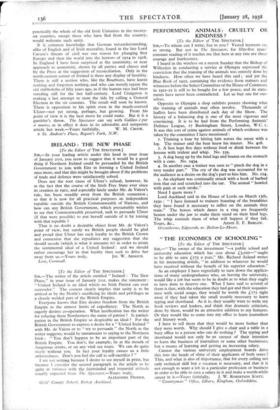" THE ECONOMICS OF SCHOOLING "
[To the Editor of THE SPECTATOR.] SIR,—" The owner of the investment "—a public school and university education which has cost about £3,000—" ought to be able to earn £175 a year," Mr. Richard Acland writes in his interesting article, " in addition to whatever he would have received without the benefit of his superior education."
As an employer I have regretfully to turn down the applica- tions of many undergraduates who, on leaving the university, would like a job but seem to be in doubt as to what they ought to have done to deserve one. What I have said to several, of them is that, with the education they had got and their acquaint- ance with social usage, they would be worth the 175 right away if they had taken the small trouble necessary to learn typing and shorthand. As it is, they usually want to write my book reviews and leaders, and think that dramatic criticism, done by them, would be an attractive addition to my features. Or they would like to come into my office to learn journalism and literary work.
I have to tell them that they would be more bother than they were worth. Why should I give a chair and a table in a busy office to a person who can do nothing ? The typing and shorthand would not only be an earnest of their intention to learn the business of journalism or some other businesses, but a means of learning and getting an increasing salary.
Cannot the various university employment boards drive this into the heads of same of their applicants of both sexes ? This, and what is also of importance, that for every calling not only technical skill but a vocation is necessary, and that it is not enough to want a job in a particular profession or business in order to be able to earn a salary in it and make a worth-while
career in it.—Yours faithfully, J. W. ROBERTSON SCOTT. " Countryman" Office, Idbury, Kingham, Oxfordshire.


















































 Previous page
Previous page